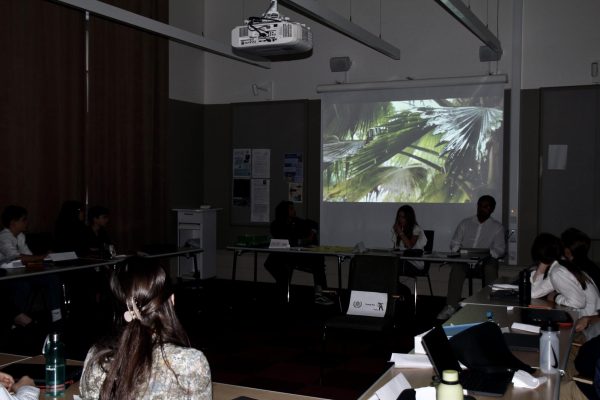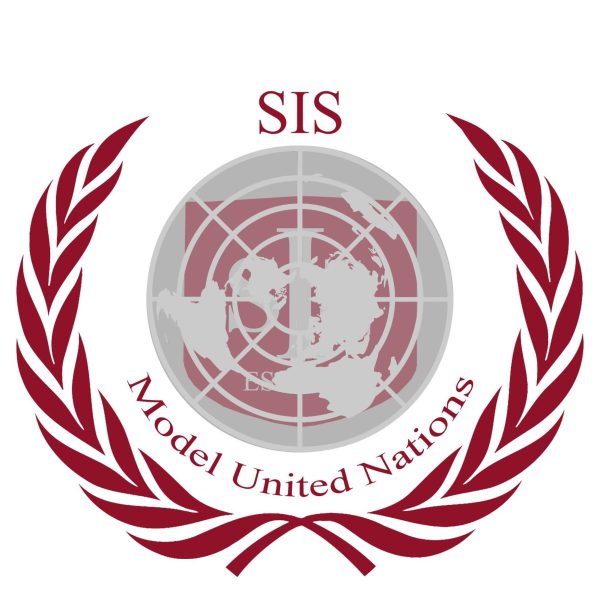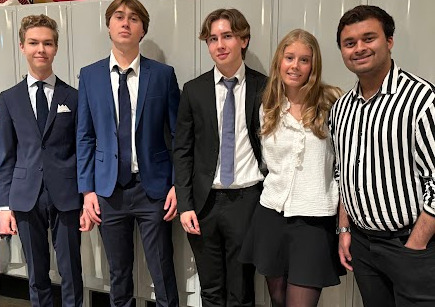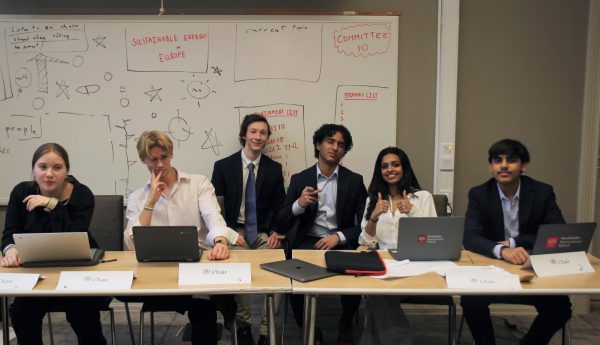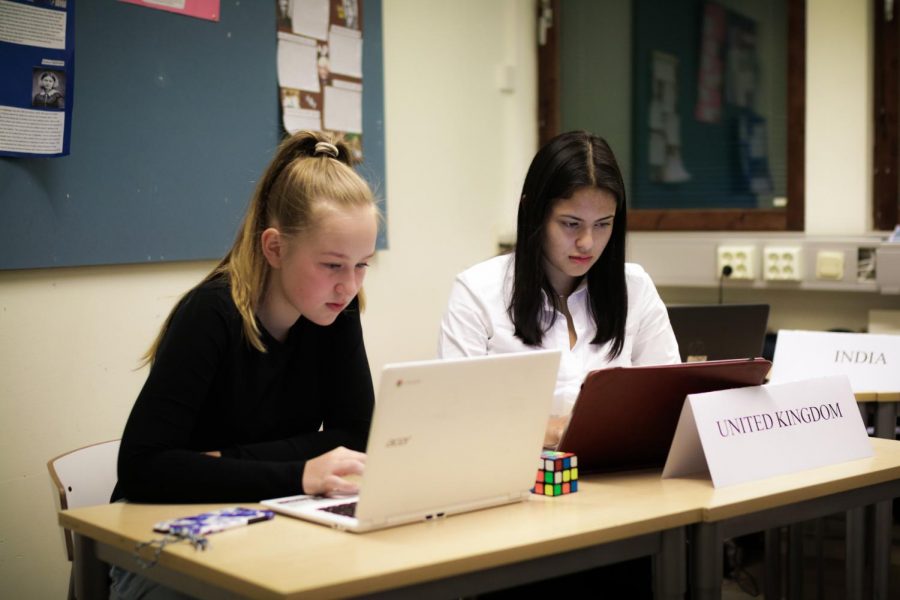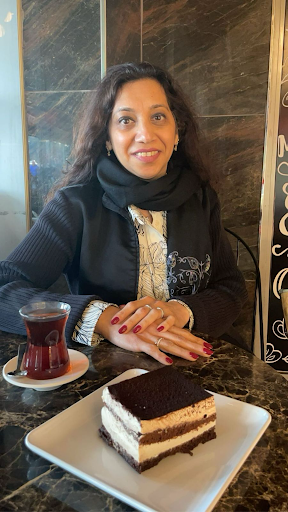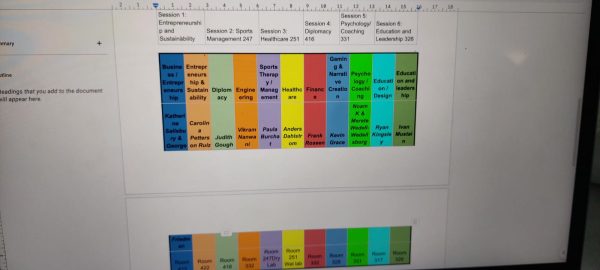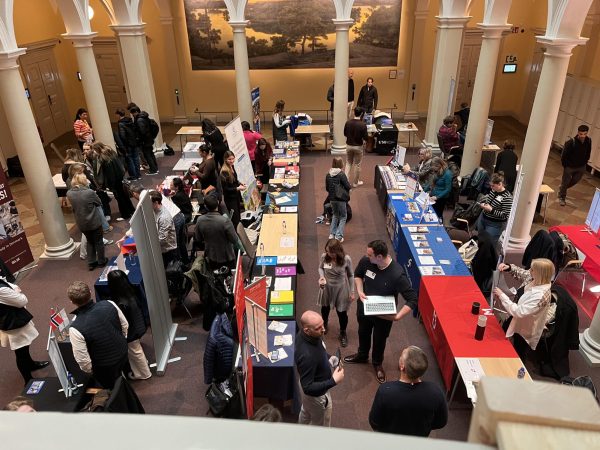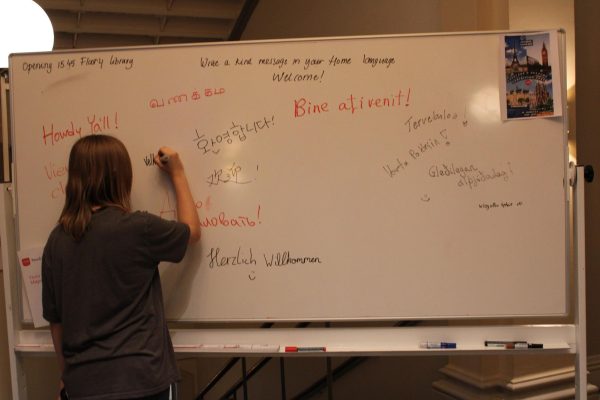SISMUN – Heated Discussions in the UN Women’s Committee
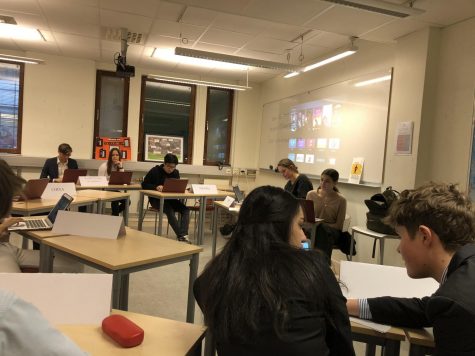
The Quirky Quibbler was honoured to be able to sit in the conference, in this article we would like to give you an impression of what the discussions were like in the Women’s Committee
The delegation of India stated that education is the way to go to empowering women, proposing that the nationwide program already implemented in India “Save Our Girls” is of global importance. This year there are two Women’s Committees participating.
In the first committee, there are delegates representing, Israel, Angola, France, Russia, United Kingdom, India, Sweden, Nigeria, United States and China.
In the second committee, delegates represent Angola, India, France, Russia, United States, Sweden, China, and Nigeria. The delegates of Italy were absent.
The discussions in the committee are very focused on empowering women and delegates are striving to propose resolutions to empower women. Education is a recurring solution that is being discussed, particularly in relation to lower economically developed countries.
Delegates are also striving to improve the position of women in political positions. The delegation of India proposed the following clause:
Insists that member states adopt a comprehensive plan to implement gender quotas for parliament seats of 30% specifically for women and leaving 70% of seats for men and women to be appointed on a basis of meritocracy;
Following an unmoderated caucus, discussions in the second women’s committee have resumed. Delegates are preparing themselves to present further resolutions and clauses.
The following clauses were presented by the delegates
The delegation of France presented the following, on the wage gap that exists in multiple countries. The delegation proposed that company directors should seel all of their employees at the same level and that it not be based on gender. The following countries voted for, UK. India, China, Nigeria and Israel. The delegation of Angola had concerns regarding the wording of the clause, this caused fruitful debate ending with the delegation of Angola adding an amendment to the clause.
The delegation of India presented a clause, proposing the implementation of educational courses and curriculums for older women, specifically married women to improve literacy rates to help women understand the civic duties required of them to participate politically in society. The delegation of Angola questioned the funding and economic aspects of this clause. Delegations voting for were India UK, Angola, Nigeria, France US, Israel and the Russian Federation.
The delegation of Angola proposed the strengthening of the monitoring and evaluation of existing policies and programmes to promote gender equality and the empowerment of women in education, training, science and technology. All delegations were in favour of this clause
Angola proposed another clause and urged for the establishment of mandatory schooling for pre-adolescent/adolescents of the female gender ranging from the age of 6-16. India requested to make a point of information, recognising that the delegation has a concern for the formulation that only mandatory schooling is for females. An amendment was proposed to mandatory schooling for mandatory schooling for pre-adolescents and adolescents of all genders. This amendment was granted. All delegations voted in favour for this clause.
France represented their amended clause, proposing company directors should see their employees on an equal level. This time all delegations were in favour.
Following the proposal of the caucuses, the delegates took a well-deserved break. After this break, the delegates will resume their discussion. Angola requested a second unmoderated caucus and this was granted.
Following refreshments, the delegates came back motivated and participated in another unmoderated caucus. The discussions resumed with a clause proposed from the Indian delegation. The clause was very well developed and is as followed
Urges for the establishment of mandatory schooling for pre-adolescents/adolescents ranging from the age of 6-16
- Encourages all LEDCs (Less economically developed countries) to establish increased accessibility to female education through, but not limited by:
- Public mandatory education from the age of 6-14 years
- A curriculum basis covering the following six subjects:
- Language and literature
- Language acquisition
- Humanities
- Mathematics
- Sciences
- Arts
- Financial assistance from MEDCs and the International Monetary Fund (IMF) to fund these schooling programs
No amendments were proposed and all delegations except the delegation of Angola voted. Therefore it passed.
The delegation of Angola presented a further two preambulary clauses, these were :
- Recognises the importance of female representation in government institutions
- Alarmed by statistics stating that merely 22% of representatives of parliament worldwide are female
The delegation recognized that the clauses were short, however, wished to inform that the importance should not be understated. The clauses passed as all delegations were in favour.
The Indian Delegation shortly thereafter presented another clause
- Clarifies that the culture of nation-states should not be obstructed by any clause in this resolution, insofar as traditions do not imply
This clause went through after multiple revotes. During the second voting session delegates from the US, Sweden, China, India and Nigeria were in favour. Opposed to the clause were France, UK, Israel, Angola and Russia. The delegation of India requested the delegation of the UK to clarify their opposition vote, essentially many delegations were confused about the motion of the clause. A third revoting got the clause passed as Israel, the US, China, Nigeria, India and the UK were in favour.
Following this, another clause was presented
Suggests the initiative for the raising of public awareness of gender inequality especially in politics through promotion means such as, but not limited to:
- Documentaries on the topic of gender inequality
- Posters and campaigns
- Incorporation of the subject of political participation into school curriculums
France asked for another explanation, this clause passed following votes from all delegations except Russia and France.
The Russian Federation proposed a clause, which harboured much discussion. The clause was as followed ” Realizing that many housewives do not have the resources to keep the home spick and span and to bring up a child. Russia would like to propose a clause giving them allowances based on the number of children they have and their social status.”
The delegations from India, Angola and the UK found the clause to be unrelated to the topic being discussed. The delegation of India and Angola gave speeches stating why they were against. Both delegations stated that they appreciated the clause however believed that an amendment was needed.
Another unmoderated caucus followed these hefty discussions.
Clauses resumed with Angola proposing a clause as follows “Urges monitoring progress in the representation of women through the regular collection and analysis of data on the political participation of women and men at all levels and the progress of political parties in providing equal and fair opportunities for women to participate”. The Angolan delegation stated that the clauses aim was to promote the engagement of women in political positions. The delegation of India called for an amendment. All countries were in favour except for Russia who abstained from voting, therefore the clause passed.
The Russian Federation thereafter re-proposed their clause with amendments, the delegation from India requested an amendment that the term “housewives” be changed to ” female politicians” as it was more relevant. Following this, the clause states the following “Realizing that many female politicians do not have the resources to keep the home spick and span and to bring up a child. Russia would like to propose a clause giving them allowances based on the number of children they have and their social status.” The heated debate did not end here, however, as the delegations of India and Angola disagreed whether voting should take place. The move for another 5 minutes of an unmoderated caucus was not passed. Therefore voting proceeded based on a shortened clause. Only the delegations of India, France, UK and Russia were in favour of the clause. Leading to the clause after hefty debate not being passed.
The committee then moved on to the resolution – which passed with all delegations voting for!
Resolution
UN Women – Leadership and Political Participation of Women Resolution:
- Insists that member states adopt a comprehensive plan to implement gender quotas for parliament seats of 30% specifically for women and leaving 70% of seats for men and women to be appointed on a basis of meritocracy;
- Requests for the implementation of educational courses and curriculums for older women, specifically married women to improve literacy rates to help women understand the civic duties required of them to participate politically in society; strengthen the monitoring and evaluation and, where appropriate, the review of existing policies and programmes to promote gender equality and the empowerment of women in education, training, science and technology, and access to full employment and decent work, in order to assess their effectiveness and impact, ensure a gender perspective in all policies and programmes and strengthen accountability;
- Urges monitoring progress in the representation of women through the regular collection and analysis of data on the political participation of women and men at all levels and the progress of political parties in providing equal and fair opportunities for women to participate.
- Urges for the establishment of mandatory schooling for pre-adolescents/adolescents ranging from the age of 6-16
- Encourages all LEDCs (Less economically developed countries) to establish increased accessibility to female education through, but not limited by:
-
- Public mandatory education from the age of 6-14 years
- A curriculum basis covering the following six subjects:
- Language and literature
- Language acquisition
- Humanities
- Mathematics
- Sciences
- Arts
- Financial assistance from MEDCs and the International Monetary Fund (IMF) to fund these schooling programs
Clarifies that the culture of nation-states should not be obstructed by any clause in this resolution, insofar as traditions do not imply:
-
- Limiting the voting rights and the political participation of women, either explicitly or implicitly
- Physical or verbal abuse of women, such as genital mutilation
- Forced or premature marriage
Suggests the initiative for the raising of public awareness of gender inequality especially in politics through promotion means such as, but not limited to:
- Documentaries on the topic of gender inequality
- Posters and campaigns
- Incorporation of the subject of political participation into school curriculums
The discussions in the women’s committee were very heft but fruitful! Delegations were very interested in improving each other’s clauses and this lead to nailbiting debates. Overall the UN Women’s committee has proposed a resolution to further the empowerment of women.
Following the more “serious” elements of the conference, a fun vote on superlatives was held. With superlatives such as best dressed, most threatening and most convincing delegation. This yielded many giggles in the room after tense discussions.


